Coronavirus: Helping the bereaved with 'emotional PPE'
- Published
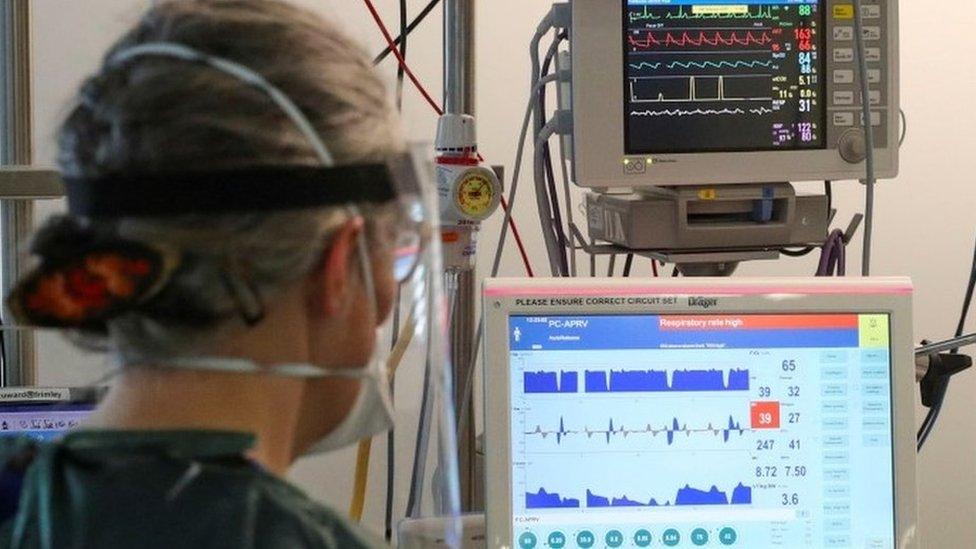
Latest figures show about 44 patients in critical care with coronavirus in hospitals in Wales
A few months ago, NHS England's medical director, Stephen Powis, stated: "If we can keep deaths below 20,000, we will have done very well in this epidemic."
At the time of writing this article, the figure stands at more than 37,000 people, external.
As a palliative care doctor, I have treated a number of people with Covid-19, some of whom have died, and I have also lost colleagues.
We have written and rewritten a huge amount of guidance and procedures, ranging from how best to manage agitation and breathlessness in Covid-19, to how best to prepare people for the worst and help them discuss treatment options.
What makes this time so difficult is that many of the usual rules of societal norm and behaviour have been thrown out of the proverbial window, due to the high risk that transmission of this virus has created.
We have had many discussions in hospitals, community and hospice settings, about how compassion can be combined with strict visiting rules, for instance. As caring health and social care professionals, it is against our nature to prevent loved-ones from coming in to support their seriously ill relatives.

Dr Mark Taubert works at Velindre NHS Trust and also teaches at Cardiff University
People have pleaded to be with their dying partner, even offering to find their own personal protective equipment (PPE) and accepting the risk should they contract the virus. Others have been understandably afraid of the very real transmission risks and have stayed away, with a broken heart.
The grief process can be complex enough in normal times, but we are guaranteed to see huge emotional fallout from this horrendous time in the coming months and years.
So it is important that we find ways of communicating well and perhaps putting on not just physical PPE in our response to this pandemic, but also to look at ways of seeking "emotional and cognitive protection".
Such preparation and responsiveness is under-prioritised at everyone's peril, because preparing for difficult conversations and understanding grief and its stages can help, in order to support ourselves and those around us.
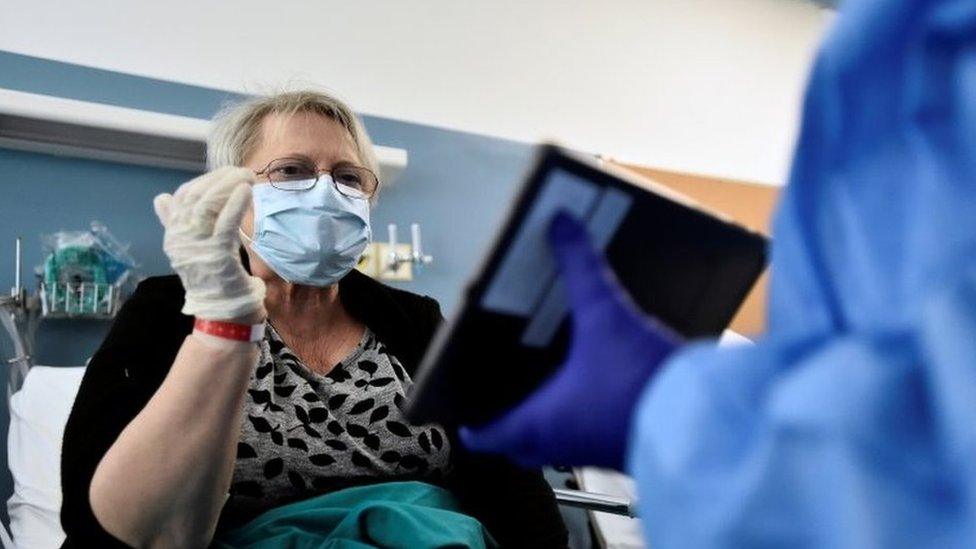
A coronavirus patient in Milan speaking to a relative on a tablet
One of the early lessons we took from Italy, where the European part of the pandemic had hit very hard in advance of the UK becoming affected, was the high number of patients who were dying alone in hospitals.
Family members and loved ones had to stay away, due to the clear risk of contracting coronavirus themselves and causing further spread.
Colleagues from Italy warned us to have video messaging software and computers ready, so that families and friends could at the very least be "with someone" remotely.
We did this and were ready, and many patients took heart from the fact that they could see their loved ones from a hospital bed, some even taking part in normal life events like dinner, with family members who had set up the laptop in their home kitchen. It is often not the complex stuff we crave when we are really ill, but the day-to-day basics.
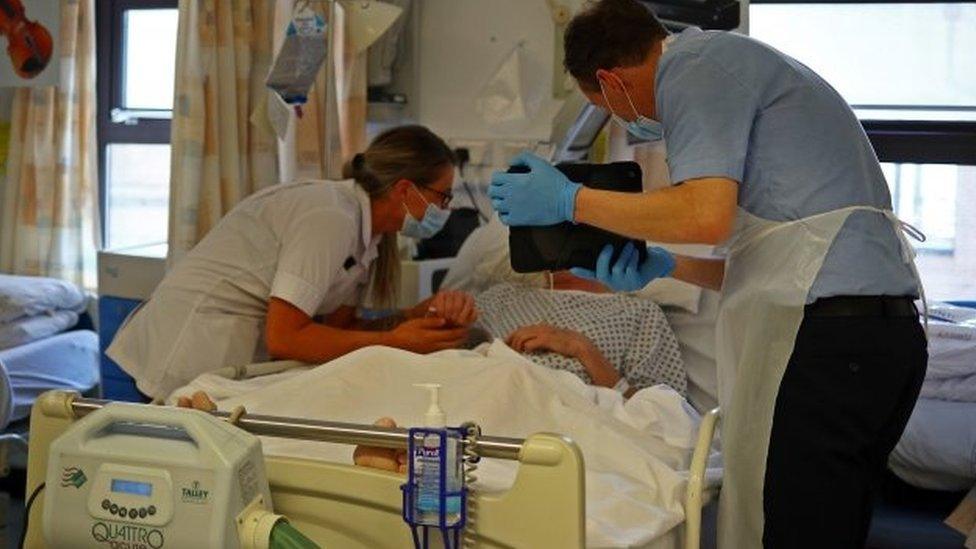
Hospitals have been helping patients communicate with relatives who cannot visit them
Knowing what to say when you, as a supporting relative, are zoomed into a hospital room can seem daunting, but we have found that it is the presence that matters most, not the perfect phrase of what best to say to the seriously ill friend or relative.
Online versus the real world, there are many new challenges. How on earth do you behave in an online-streamed funeral and what should and shouldn't you say. I'd state that similar rules apply for online, as they do for the real-life events.
Many religious organisations have quickly adapted and most funeral homes can now give advice on not only physical but also online attendance. This may go some way to reassure people, but a recent survey suggested many are still afraid of saying the wrong thing.
In my experience, people's grief is worsened by the absence of people's offers of help, rather than by attempts to say the right or wrong thing.
So the fundamental thing is to show our readiness to provide a listening ear at any time, and that can be via video-messaging, in person or even by WhatsApp. Know what your friend or relative will respond to best and then send them a message. Less is not necessarily more when it comes to grief.
I see my recent forays into video consultations as an example to illustrate this: For me and my team, some of the previously held notions have been severely challenged: before Covid-19, I would never have dreamed of communicating bad news, such as progression of cancer on a scan, or the death of a loved one, by telephone or video messaging.
But I have had to adapt. And so have many of my colleagues, patients and those close to them. I have shared the key lessons with students and postgraduate doctors. But some of them are relevant to many aspects of life, where perhaps bad news may have to be shared via video-message. Imagine you need to break the bad news that someone in your family has died.
Or perhaps you want to express your heartfelt condolences to someone via video. How exactly do you get this right? Perhaps there is no perfect way, but there are some tips I can share.
Conversations with bad news
It is important to be in a quiet, undisturbed room. Consider warning those nearby that you are about to have a serious conversation.
Regarding the bad news, how much does the person suspect already? Have a plan for what to do next, before making the call, for instance if you can, you may wish to tell the person you are talking to that you will be in touch again tomorrow.
A good tip to maintain your "emotional PPE", is to take breaks: If I've had multiple difficult phone or video conversations in a short time I take a break in between, as I would with real-life conversations.
So should you, if you are conveying information of the death of a beloved family member to the wider family and/or community, one by one. Perhaps someone you trust can help you do this, so that you are not the only one.
I've also made the classic error of not taking a toilet break prior to such a difficult call, so do consider the length of time you may be.
Is it OK or even safe for them to talk right now? People pick up their smartphone in all sorts of situations and you may have to state that you will call back when they have stopped their car. Are they alone or is there anyone around who can potentially support later?
These sorts of conversations are never easy. Neither is grief. Grief for a lost loved one, or the grief of realising that a cancer has spread and that time will be short
I tend to give a warning shot of what may be coming: I nearly always preface that I have some difficult news. I might say something like: "I am sorry, but there is some news that is not good, and I wanted to let you know about this."
If someone asks me to stop there, I do so, and offer a further phone or video call later on. They are not ready yet, but will probably feel a need to speak later. They need time to prepare.
Tell the news: Give a summary of what you know. I do this with compassion, but also go in without too much prelude (apart from a warning shot) or hesitation. People want to know now, in my experience, so it is best not to make them wait, with too many platitudes. I once heard a healthcare professional talk about how great the weather was, before giving the bad news.
What I often do is intersperse the news with occasional questions, checking what the person I am talking to already knows, or if they need a break, but then I try to align this with the newest information. I often find that people have already suspected and thought about the different bad news scenarios. "Yes, doctor, this is what I was fearing all long."
Don't use jargon, be as clear as you can be.
In closing these conversations, I try to bring people back into the now and the next few days. What will you do now? Shall we make a plan together? Are there other people you need to tell? Who is there to support you? I often phone back sooner if there aren't many people to support. I also try to ask the person to summarise a bit about what was talked about. It allows for questions, but we can also sometimes state how hard this all is.
Sometimes, the white noise that breaks into our brains after a sentence like: "Your cancer has spread" or "Malcolm has just died", is so intense, that nothing beyond that is heard or understood. So I never assume that any other points I have tried to cover will be remembered, but a summary at the end can allow the person to come back with questions that are important to them and help clarify things.

In Corsica, a nurse writes down a family message to be placed in a coffin
In closing, I often make a point of sharing my own sadness about this situation and it sometimes helps people to know how much we care, and that we are all human. It can be a way to help people verbalise their own feelings, if they are perhaps less used to doing so.
"Yes, this is all so strange and sad, and I wish we were not in this terrible situation", can open up an important discussion about regrets and fears.
These sorts of conversations are never easy. Neither is grief. Grief for a lost loved one, or the grief of realising that a cancer has spread and that time will be short.
On balance, we all appreciate the ability to have conversations, rather than none at all, so I suspect video and audio conversations are here to stay, even for condolence messages.
To get the best emotional and cognitive PPE, we need to understand ourselves and we need to understand grief itself, as hard as that may sound.
- Published4 April 2020
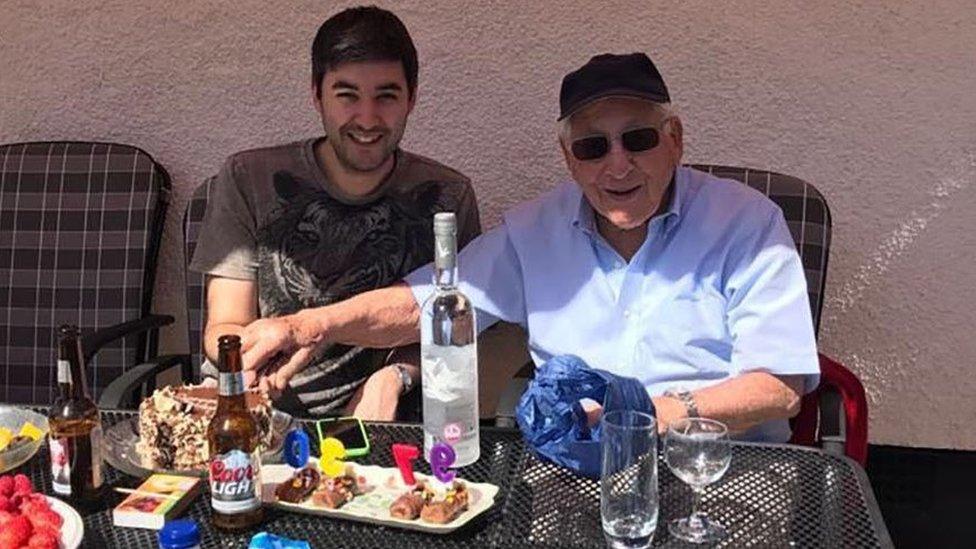
- Published1 April 2020
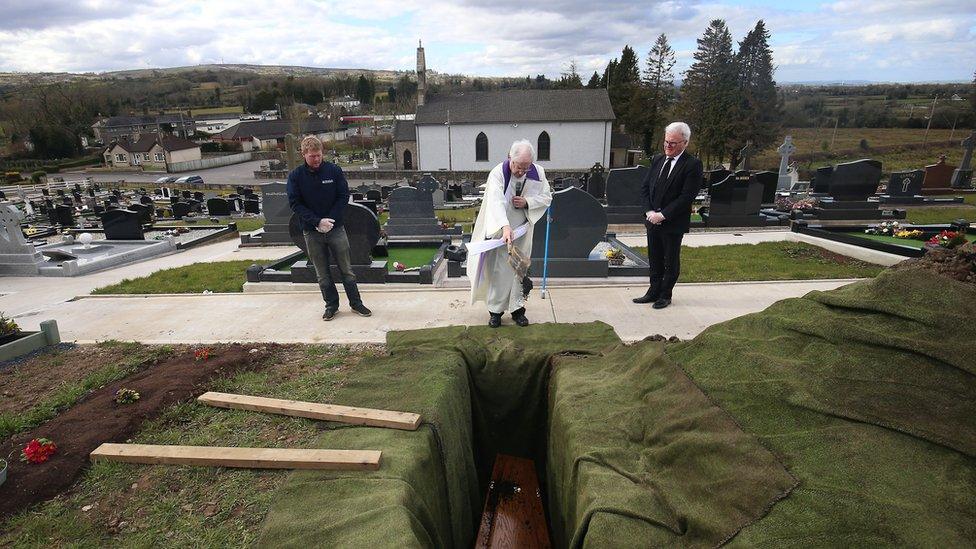
- Published29 March 2020

- Published28 March 2020
